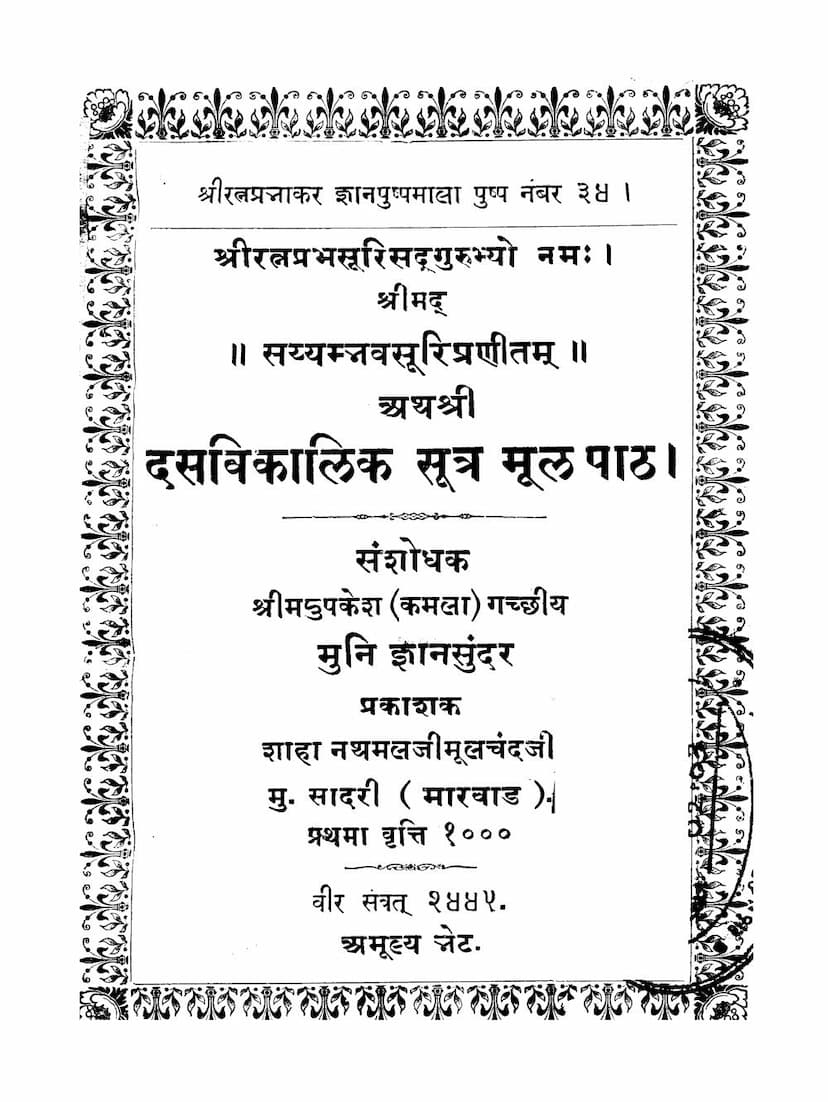Dasvaikalik Sutra Mool Path
Added to library: September 1, 2025

Summary
This document is a Jain text titled "Dasvaikalik Sutra Mool Path" (The Dasavaikalika Sutra, Original Text), compiled by Muni Gyansundar and published by Nathmalji Moolchandji Shah. The introduction (Prastavna) emphasizes the importance of knowledge (Jnana) as the supreme element in Jainism.
Here's a breakdown of the key themes and content:
Introduction (Prastavna):
- The Greatness of Lord Mahavir's Teachings: The introduction extols the virtues of Lord Mahavir's teachings, described as beneficial to all beings, leading to liberation, dispelling ignorance, and inspiring wonder. His teachings are said to bring about the ultimate welfare of the soul in all three times (past, present, future), three worlds, and three states of existence.
- The Centrality of Knowledge: The text stresses that knowledge is the source of liberation. It quotes various sayings like "Without knowledge, everything is darkness," "Knowledge is breath," "Knowledge is not sin; one is freed by self-knowledge," and "First knowledge, then faith, then conduct – this is the path of all ascetics." It asserts that the soul itself is of the nature of knowledge, and true liberation can only be attained through knowledge.
- Knowledge as the Foundation: Knowledge is presented as the bedrock upon which faith (Darshan) and conduct (Charitra) rest. Without knowledge, faith and conduct are considered meaningless, like empty shells, fake currency without stamps, or idols without life. All rituals, penances, vows, and practices are deemed successful only when imbued with knowledge.
- The Importance of the Dasavaikalika Sutra: The Dasavaikalika Sutra is highlighted as a crucial scripture, revered by sages like Shyayambhava Suri. It contains 120 verses that illuminate the three essential elements: knowledge, faith, and conduct. It is considered a pillar and pinnacle of the Jain faith.
- The Path to Liberation: The text explains that even with the vastness of human intellect, the obscuring karmas can be overcome through determined effort (purushartha), leading to the soul's transcendence and immortality. Therefore, worshipping knowledge is the primary duty of aspiring souls to end all karmas.
- The Enduring Legacy: The introduction notes that while many other scriptures may have been lost or fragmented, the Dasavaikalika Sutra, with its four chapters, will remain for the duration of the fifth era. It mentions prominent figures who attained liberation through its study and practice.
Core Teachings and Structure of the Sutra (as seen in the sampled pages):
The subsequent pages contain the actual text of the Sutra, divided into chapters (Adhyayan) and verses. Based on the provided pages, the Sutra appears to focus on:
- The Nature of Asceticism (Samanya): The initial verses describe the path of an ascetic, emphasizing non-violence, self-control, and penance as essential. The text uses metaphors like bees extracting nectar from flowers without harming them to illustrate how ascetics should live in the world.
- Ethical Conduct and Renunciation: The text delves into the principles of renunciation, detachment from worldly desires and passions (kama, krodha, etc.), and the avoidance of actions that lead to karmic bondage. It advises on controlling the mind and senses.
- The Five Great Vows (Mahavratas): The text elaborates on the five major vows:
- Ahimsa (Non-violence): Abstaining from harming any living beings, including mobile (tras) and immobile (sthavara) ones. It details the various categories of living beings.
- Musavada (Truthfulness): Avoiding falsehood, speaking truthfully and without malice.
- Adinnadana (Non-stealing): Not taking anything that is not freely given.
- Maithuna (Celibacy/Chastity): Abstinence from sensual indulgence.
- Parigraha (Non-possession): Non-attachment to worldly possessions.
- Rules for Ascetics (Nigranthas): The Sutra outlines strict rules and prohibitions for Jain monks and nuns (Nigranthas), emphasizing:
- Restrictions on food and drink: Specific rules about what can be accepted and consumed, avoiding items that are prepared in advance, mixed, or have a mixture of living beings. This includes detailed guidelines on accepting alms, fruits, vegetables, water, and fire.
- Careful movement and actions: Emphasizing mindfulness in walking, speaking, and all activities to avoid harming any living beings. This includes specific instructions on how to move, sweep the path (rajoharana), and handle various objects.
- Renunciation of worldly comforts: Prohibitions against using certain types of bedding, clothing, adornments, and engaging in activities like bathing for pleasure or using perfumes.
- The practice of penance and self-control: The importance of enduring hardships (parishaha) and controlling the senses and passions.
- The Path to Liberation (Siddhi): The Sutra guides the aspirant towards the path of liberation by understanding the nature of the soul and non-soul, overcoming karmas, and achieving right faith, knowledge, and conduct. It outlines the stages leading to the destruction of karmas and attainment of salvation.
- The Importance of Respect for Gurus: The text repeatedly stresses the importance of humility, respect, and obedience towards one's spiritual teachers (gurus), as they are the guides on the path to liberation.
- The Fourfold Samadhi (Concentration/Composure): The later chapters discuss four types of composure: Vaisaya Samadhi (composure related to sensory objects), Suya Samadhi (composure related to scriptures), Tapa Samadhi (composure related to penance), and Achara Samadhi (composure related to conduct). Each of these is further broken down into subcategories.
Overall Message:
The Dasavaikalika Sutra, as presented here, is a foundational text for Jain ascetics and serious practitioners. It provides a comprehensive guide to the rigorous path of spiritual discipline, emphasizing the paramount importance of knowledge, non-violence, self-control, and detachment as the means to achieve liberation from the cycle of birth and death. The detailed rules and ethical guidelines underscore the Jain commitment to minimizing harm and cultivating inner purity.